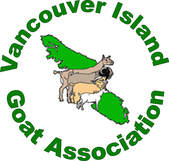So you are thinking of getting a goat....
With the increasing popularity of goats on Vancouver Island, new goat buyers need to be aware of what to consider and questions to ask when purchasing goats.
Do your research!
There are many resources on the internet as well as at your local library. Visit goat farms. Connect with an organization such as the Vancouver Island Goat Association and talk to long-time goat breeders.
Why do you want a goat? For milk, meat, fibre, packing, or pet? You need to know what breed of goat best fits your situation and what is required to house and feed goats.
Don’t buy trouble!
Signs of good health include bright eyes, smooth shiny coat, lack of abscesses, tail relaxed or upright (not tucked under), firm pelleted stool. Never buy goats that appear unhealthy. Ask the breeder if you can visit their farm. Does the herd look healthy and well cared for?
Be aware that some signs of ill health may not be readily apparent. Ask if the herd is tested regularly for infectious and incurable diseases such as Johne’s disease, Caseous Lymphadenitis (CL), and Caprine Arthritic Encephalitis (CAE).
Don’t be afraid to ask questions!
Breeders should be willing to answer any questions you may have regarding the health of their herd. If you are not sure about something, consult a veterinarian who works with livestock.
Be prepared!
Goats are herd animals and they need another goat companion to be happy. Shelter from rain and clean bedding must be provided. Goats need a good fence to keep them in.
Contrary to popular belief, goats do not eat everything. Goats require good quality hay and mineral supplements to maintain good health.
Goats are more particular about water quality than other livestock; they require continuous access to clean water. Goats may refuse dirty water, leading to dehydration and reduced feed intake, resulting in health complications.
Keeping your new goats healthy!
The breeder should be willing to provide a period of mentorship after you purchase a goat. Ask what vaccinations and dewormers the breeder uses, and what management strategies they use. Develop a relationship with a local veterinarian who works with small ruminants (i.e. goats and sheep).
Practice biosecurity on your farm and when you visit others - all visitors should remove manure and disinfect their shoes with bleach before and after each farm visit to prevent the transmission of infectious diseases. Wearing disposable booties is recommended. Biosecurity information for the general public can be found on the Canadian Food Inspection Agency website: Biosecurity Information for the General Public
Do your research!
There are many resources on the internet as well as at your local library. Visit goat farms. Connect with an organization such as the Vancouver Island Goat Association and talk to long-time goat breeders.
Why do you want a goat? For milk, meat, fibre, packing, or pet? You need to know what breed of goat best fits your situation and what is required to house and feed goats.
Don’t buy trouble!
Signs of good health include bright eyes, smooth shiny coat, lack of abscesses, tail relaxed or upright (not tucked under), firm pelleted stool. Never buy goats that appear unhealthy. Ask the breeder if you can visit their farm. Does the herd look healthy and well cared for?
Be aware that some signs of ill health may not be readily apparent. Ask if the herd is tested regularly for infectious and incurable diseases such as Johne’s disease, Caseous Lymphadenitis (CL), and Caprine Arthritic Encephalitis (CAE).
Don’t be afraid to ask questions!
Breeders should be willing to answer any questions you may have regarding the health of their herd. If you are not sure about something, consult a veterinarian who works with livestock.
Be prepared!
Goats are herd animals and they need another goat companion to be happy. Shelter from rain and clean bedding must be provided. Goats need a good fence to keep them in.
Contrary to popular belief, goats do not eat everything. Goats require good quality hay and mineral supplements to maintain good health.
Goats are more particular about water quality than other livestock; they require continuous access to clean water. Goats may refuse dirty water, leading to dehydration and reduced feed intake, resulting in health complications.
Keeping your new goats healthy!
The breeder should be willing to provide a period of mentorship after you purchase a goat. Ask what vaccinations and dewormers the breeder uses, and what management strategies they use. Develop a relationship with a local veterinarian who works with small ruminants (i.e. goats and sheep).
Practice biosecurity on your farm and when you visit others - all visitors should remove manure and disinfect their shoes with bleach before and after each farm visit to prevent the transmission of infectious diseases. Wearing disposable booties is recommended. Biosecurity information for the general public can be found on the Canadian Food Inspection Agency website: Biosecurity Information for the General Public

